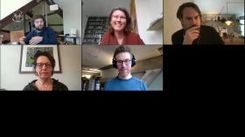Procurement - Open unless...
A large number of organisations are working on smarter and ethical procurement of (open source) software. How does this work in SMEs, education, Dutch municipalities, public organisations, healthcare and government?
Moderator
Douwe Schmidt
Table guests
- Boris Hoytema - Foundation for Public Code
- Diederik Hoekstra - VPRO Head of Audience & Marketing Department
- Annelies van der Stoep - Amsterdam Economic Board
- Christien Bok - SURF (the ICT cooperation organisation of education and research in the Netherlands)
Recap
Procurement sits between different departments, which is sometimes a coordination problem. Amsterdam Economic Board focuses on sustainable procurement. There is no Paris agreement around responsible use of data.
The biggest hurdle is the drive towards centralisation. Our role is for people to focus on the role of their own problems so that others can benefit. In the public sector, this is complicated because organisations never dare to fail.
If you organise collectively you are stronger towards the market. Microsoft adjusted its privacy terms to what we as buyers were asking for.
However, the problem is not only cooperation between organisations, but also within an organisation. How do you get all the noses in the same direction?
Is using or not using a procurement procedure a problem when picking up OS? OS requires a different approach, because it has to be deployed in your system in a different way. If there are good alternatives available, we use them, with or without in-house development.
We want to develop innovative procurement ways, e.g. a dynamic procurement system.
The cultures of the different worlds in the public sectors are much less similar than I expected. But there is also a big gap to bridge between the market and public organisations.
In practice, a lot is pushed to ICT, but that is not a fruitful attitude. Creates too often the idea that you can always outsource it too. And we have all become tech companies. So you shouldn't centralise that responsibility in one place.
You have to first know very well what you want, then what comes from the market, what do you want to manage yourself, and what alternatives do you discover?
Software that is developed with public funds should also become OS in Italy. But you can then still play a substantive role in cooperation. In NL, you are allowed to develop os software developed for public task. Because it does not distort the market.
We need to move towards a collaborative revenue model.
There is no Paris agreement around responsible use of data.
Annelies van der stoep, Amsterdam Economic Board
